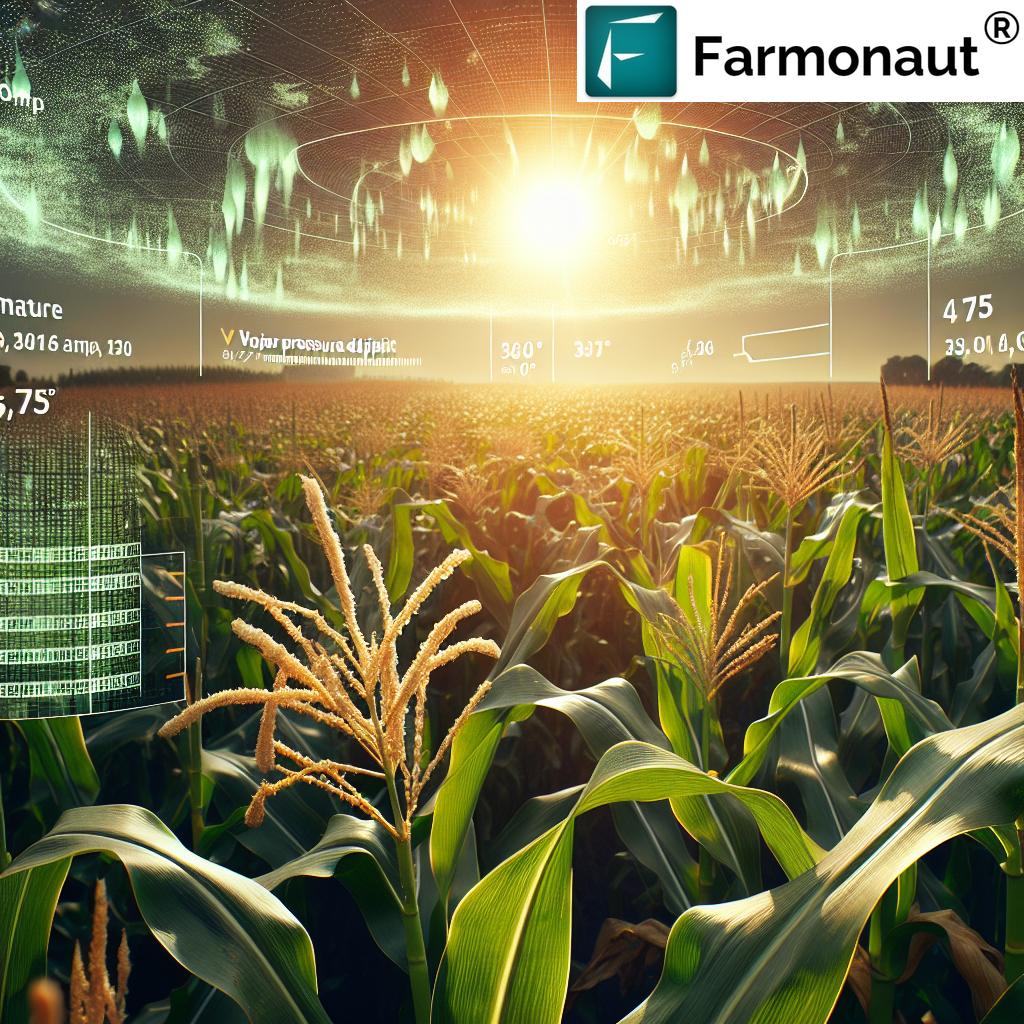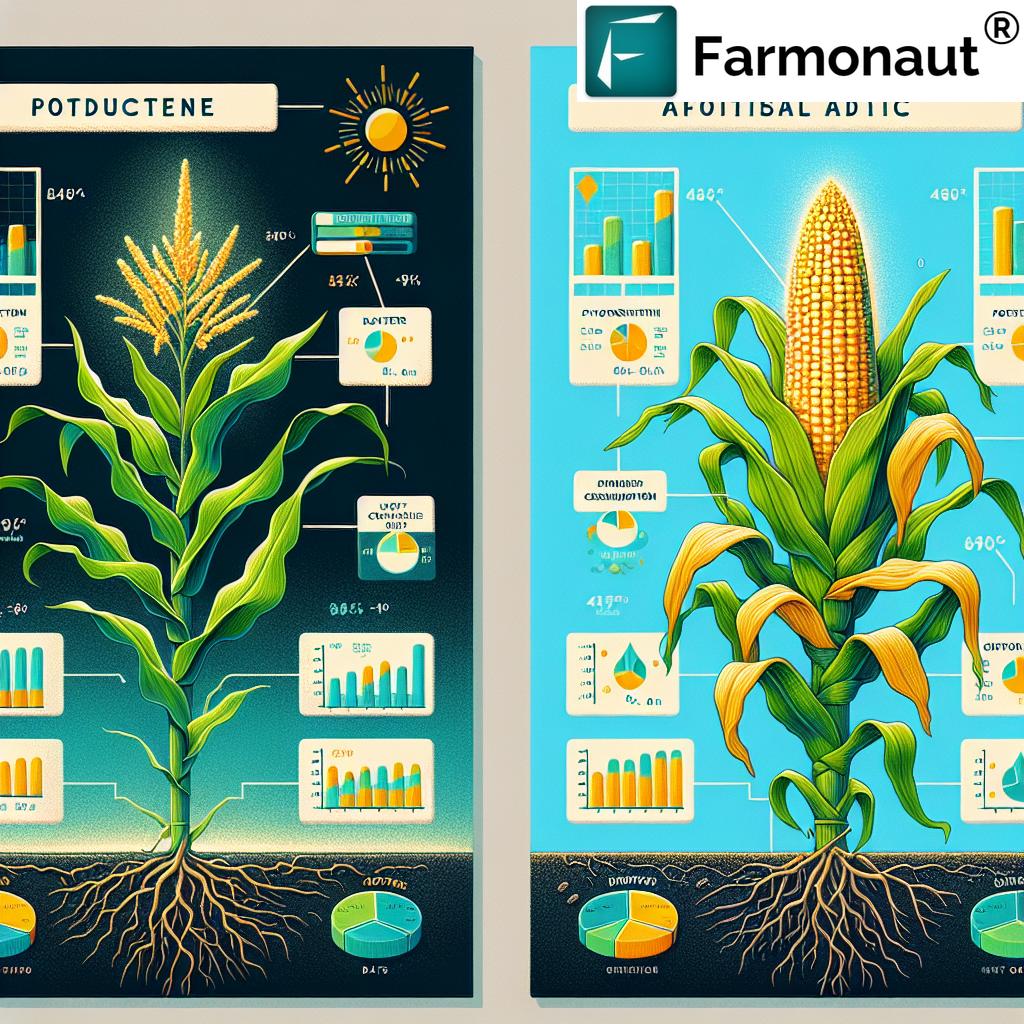Mastering Heat Stress in Corn: Farmonaut’s Guide to Optimizing Yield in Iowa’s Changing Climate
“Corn exposed to temperatures above 95°F (35°C) for just 2-3 days can experience up to 40% yield reduction.”
As we delve into the intricate world of corn production in Iowa, we’re faced with an increasingly pressing challenge: heat stress. In this comprehensive guide, we’ll explore how rising temperatures are affecting corn yields and provide valuable insights on optimizing crop performance in the face of climate change. At Farmonaut, we’re committed to equipping farmers with cutting-edge tools and knowledge to thrive in these changing conditions.
Understanding Heat Stress in Corn
Heat stress occurs when temperatures rise above the optimal range for corn growth, typically around 86°F (30°C). As global temperatures continue to climb, Iowa’s corn belt is experiencing more frequent and intense heat waves, posing significant risks to crop productivity.
- Photosynthesis disruption
- Reduced pollen viability
- Accelerated water loss
- Increased susceptibility to pests and diseases
These factors combined can lead to substantial yield losses, making it crucial for farmers to adopt proactive management strategies.
The Impact of Climate Change on Iowa’s Corn Production
“Iowa’s average summer temperatures have increased by 1.3°F since 1895, intensifying heat stress risks for corn crops.”
Climate change is reshaping Iowa’s agricultural landscape. With longer growing seasons and more frequent extreme weather events, corn farmers face new challenges in maintaining consistent yields. Let’s examine how these changes are affecting key aspects of corn growth:
Photosynthesis Under Heat Stress
Corn, like all plants, relies on photosynthesis to convert sunlight into energy for growth. However, when temperatures soar, this vital process becomes less efficient. High heat can cause:
- Reduced carbon fixation rates
- Increased photorespiration
- Damage to photosynthetic apparatus
These effects can significantly impact overall plant productivity and, ultimately, yield potential.
Pollination Temperature Effects
One of the most critical stages in corn development is pollination. Heat stress during this period can have devastating consequences:
- Decreased pollen viability
- Reduced silk receptivity
- Asynchronous pollen shed and silk emergence
Even a few days of extreme heat during pollination can result in poor kernel set and substantial yield losses.
Vapor Pressure Deficit (VPD) in Crops
VPD is a crucial factor in plant-water relations that’s often overlooked. As temperatures rise, so does the VPD, leading to:
- Increased water loss through transpiration
- Reduced water use efficiency
- Stomatal closure, limiting CO2 uptake
Understanding and managing VPD is essential for optimizing corn growth under heat stress conditions.
Critical Temperature Thresholds for Corn
To effectively manage heat stress, it’s crucial to understand the temperature thresholds that trigger various physiological responses in corn plants. Here’s a detailed breakdown:
| Temperature Range (°F) | Growth Stage | Heat Stress Effects |
|---|---|---|
| 86-95 | All stages | Mild stress; slight reduction in photosynthesis |
| 95-100 | Vegetative | Accelerated leaf senescence; reduced stem elongation |
| 95-100 | Flowering | Pollen viability issues; silk desiccation |
| 100-105 | Grain Filling | Kernel abortion; reduced grain weight |
| >105 | All stages | Severe cellular damage; potential plant death |
By monitoring these thresholds and implementing timely interventions, farmers can mitigate the worst effects of heat stress on their corn crops.
Adaptation Strategies for Managing Heat Stress
At Farmonaut, we believe in empowering farmers with knowledge and tools to adapt to changing climatic conditions. Here are some effective strategies for managing heat stress in corn:
1. Precision Agriculture Techniques
Leveraging technology can significantly improve heat stress management:
- Satellite-based crop monitoring for early stress detection
- Variable rate irrigation to optimize water use
- Climate-smart planting dates based on historical and forecasted data
Explore Farmonaut’s precision agriculture solutions:
2. Crop Management Practices
Adopting heat-resistant farming techniques can make a significant difference:
- Conservation tillage to improve soil moisture retention
- Mulching to reduce soil temperature and evaporation
- Intercropping with heat-tolerant companion plants
3. Genetic Improvement
Selecting heat-tolerant corn varieties is crucial for long-term adaptation:
- Drought-resistant hybrids
- Varieties with improved pollen viability under high temperatures
- Cultivars with enhanced root systems for better water uptake
Farmonaut’s Agtech Solutions for Heat Stress Management
At Farmonaut, we’re dedicated to providing farmers with cutting-edge tools to combat heat stress and optimize corn yields. Our suite of services includes:
1. Real-time Crop Health Monitoring
Our satellite-based monitoring system provides up-to-date information on crop health, allowing for early detection of heat stress symptoms. This enables farmers to take swift action and minimize yield losses.
2. AI-powered Advisory System
Our Jeevn AI technology analyzes multiple data points, including weather forecasts and satellite imagery, to provide personalized recommendations for managing heat stress in your corn fields.
3. Precision Resource Management
Optimize your water and nutrient application with our data-driven insights, ensuring your corn crops receive the right resources at the right time to withstand heat stress.
Access Farmonaut’s advanced agtech solutions:
The Future of Corn Production in a Changing Climate
As we look ahead, it’s clear that adapting to heat stress will be crucial for sustaining corn production in Iowa and beyond. By embracing innovative technologies and sustainable farming practices, we can build resilience in our agricultural systems.
Key areas of focus for the future include:
- Developing more heat-tolerant corn varieties through advanced breeding techniques
- Implementing climate-smart agricultural policies
- Investing in water management infrastructure
- Promoting farmer education and knowledge sharing
At Farmonaut, we’re committed to being at the forefront of these advancements, providing farmers with the tools they need to thrive in an ever-changing agricultural landscape.
Conclusion: Empowering Farmers in the Face of Heat Stress
As we’ve explored throughout this guide, heat stress poses significant challenges to corn production in Iowa. However, with the right knowledge, tools, and strategies, farmers can adapt and even thrive in these changing conditions.
By leveraging Farmonaut’s advanced agtech solutions, implementing best practices for heat stress management, and staying informed about the latest research and innovations, Iowa’s corn farmers can continue to produce bountiful harvests for years to come.
Remember, the key to success lies in proactive management and embracing technology. Together, we can build a more resilient and sustainable future for corn production in Iowa and beyond.
Ready to take your corn farming to the next level? Explore Farmonaut’s comprehensive suite of agtech solutions:
FAQs: Heat Stress Management in Corn
- Q: What temperature is considered heat stress for corn?
A: Corn typically experiences heat stress when temperatures exceed 86°F (30°C), with severe stress occurring above 95°F (35°C). - Q: How does heat stress affect corn yield?
A: Heat stress can reduce corn yields by disrupting photosynthesis, damaging pollen viability, accelerating water loss, and increasing susceptibility to pests and diseases. - Q: What are some signs of heat stress in corn plants?
A: Signs include leaf rolling, wilting, reduced growth rate, premature leaf senescence, and poor kernel development. - Q: How can farmers mitigate heat stress in corn?
A: Strategies include optimizing irrigation, selecting heat-tolerant varieties, adjusting planting dates, and using precision agriculture techniques for targeted management. - Q: Can Farmonaut help monitor heat stress in corn fields?
A: Yes, Farmonaut’s satellite-based crop monitoring system can detect early signs of heat stress, allowing farmers to take timely action.
Farmonaut Subscriptions
Explore our API capabilities: Farmonaut API
For developers: API Developer Docs








